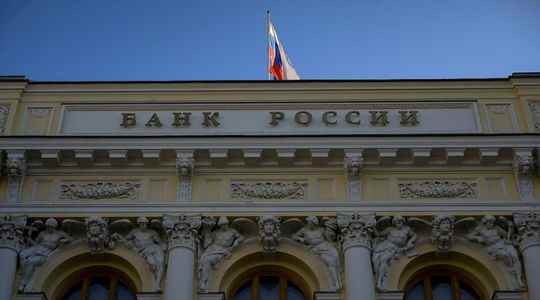In this month of May 2022, Russia simultaneously sees its currency at its highest level for two years and its inflation equaling a record from twenty years ago. It is therefore difficult to know how the russian economyplagued by five sanctions packages since February 2022, and soon to be targeted by a sixth, currently being prepared by Western countries.
On February 24, 2022 and the days following the invasion of Ukraine, the Central Bank of Russia intervened for the first time in years in order to stabilize the financial system, as an anticipation of the difficulties to come. It first spent more than a billion dollars to support the ruble, before raising its interest rates to 20%. For its part, the government adopted a decree prohibiting the sale of securities belonging to foreigners and imposed on Russian companies the conversion into rubles of at least 80% of their income from this same foreigner.
To these emergency measures must be added the gains of the major Russian energy companies, which collected 1,800 billion rubles in April, twice as much as last year at the same period, i.e. half of their income. annual. The largest gas exporter and second oil producer in the world continues, for the moment, to supply certain countries which are hostile to it and benefits from the increase in the price of these two raw materials. “Because of the rise in hydrocarbon prices, export earnings are only falling moderately, while imports are falling sharply”, explains to L’Express Julien Vercueil, lecturer in economics at Inalco. “The imbalance between supply and demand for rubles is driving its exchange rate up.”
Despite this, the financial sector remains vulnerable. Russia’s central bank, for example, recently placed a troubled Russian bank under conservatorship. An embargo on oil or gas could also unscrew the rouble, as Russia does not have enough foreign currency to support it in the long term. “If Europe refuses Russian oil, Russia loses about 40% of its oil exports,” said financial analyst Andrey Movshan in the Russian daily. Novaya Gazeta.
Household demand undermined by inflation
Not sure that the relative good health of the ruble reassures Russian consumers, who have seen the prices of basic necessities soar for several weeks. Thus, compared to April 2021, the cost of butter has increased by 26.1%, that of fruit and vegetables by 33% and the price of cereals has jumped by 35.5%. “The Russian central bank currently estimates that inflation over the whole year will be between 18 and 23%. This has a direct consequence on the purchasing power of the most modest, who are suffering from the situation caused by their president”, observes Julien Vercueil. “The fall in purchasing power will have lasting effects on demand, yet it is the main engine of growth in Russia,” he adds.
The problem of employment then arises, because it is linked to domestic demand, and two million jobs could be eliminated by December. “Investment and household consumption are declining in Russia, at an annual rate of more than 10%, so if we add the supply difficulties to come in many industrial sectors, the drop in demand will weigh on employment by the end of the year”, explains Julien Vercueil.
Industrial production in Russia depends heavily on supplies from the rest of the world, so banning the country could cripple its economy. “The automotive sector is particularly integrated into the ‘Western’ value chains and therefore currently almost completely at a standstill for lack of parts”, notes the Inalco professor. This dependence is also observed in the military-industrial sector and in that of gas extraction. “To emerge from the ground in the Russian far north, gas liquefaction complexes need modules from abroad”, explains Julien Vercueil.
On Wednesday, May 25, a new difficulty was added for Russia: the United States now prohibits it from repaying its foreign debt in dollars. However, this represents 20% of its total public debt. And while the Kremlin has announced that it will honor its commitments by paying in roubles, one of its obligations forbids this, leaving the possibility of default. “The loss of competitiveness could turn out to be more pronounced than the reference scenario assumes,” admits the Russian Central Bank. By wanting to reconquer the territories of a lost Empire, Vladimir Putin could well, at the same time, cause the great backward leap of the Russian economy.
